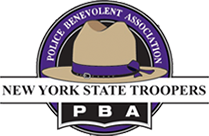PBA speaks out against Division of State Police’s gas mask policies
PBA, 2003-04-14
In an article in the NY Post that ran on Sunday, April 13, 2003, PBA President Dan De Federicis and Troop K Delegate Billy Staviski were quoted about the PBA’s criticisms of Division’s gas mask policies.
To read the article, scroll down below for the text and photo accompanying the story, or click on the following link: http://www.nypost.com/seven/04132003/news/regionalnews/73304.htm
COPS IN GAS MASK FUROR
By AL GUART
BAD BREATH:
State Police union delegate William Staviski demonstrates the gas mask and manual that troopers carry around on LIRR and Metro-North trains.
– Michael Sofronski
April 13, 2003 —
State troopers on security duty on city-bound Metro-North and LIRR trains say a new ruling by their bosses that bars them from pre-assembling their gas masks could endanger lives, according to the cops union.
Hundreds of troopers have been told they will face insubordination charges if they "activate" their gas masks at any time other than an emergency, said trooper Patrolmen’s Benevolent Association President Dan De Federicis.
"It’s unacceptable to us that 19 months after 9/11, the division of State Police still has not bought enough state-of-the-art gas masks for all of our troopers," De Federicis said. "Now they are creating bureaucratic roadblocks to our safety by shortsighted, penny-pinching and unwarranted threats of charges."
The masks come with a filter in a sealed bag. For the mask to work, the filter has to be taken out of the bag and inserted into the mask’s breathing duct.
Keeping the $50 filter inside its airtight foil package extends shelf life to 10 years, according to the manufacturer, Safe Equipment Australia. Once opened, a filter must be replaced within a year for maximum protection.
Tests at the State Police academy showed it can take up to 90 seconds to install a filter and fit the mask. The U.S. military allows nine seconds for a soldier to secure a mask where the filter has already been fitted, said William Staviski, a union delegate for the state troopers PBA.
Staviski says the lost time his members face in having to fit filters, before helping stop and evacuate the train, could be critical in the event of a terror attack.
"Even if it’s tear gas, the trooper will be incapacitated and will have been useless to have on that train," Staviski said.
The union charges the state’s gas-mask policy is based on money and points out that Port Authority cops and state police in Connecticut and New Jersey keep gas masks pre-assembled.
About 300 New York state troopers began getting the masks shortly after March 21, and another 500 are expected to get them.
If every trooper opened his filter, which can be used in a chemical, biological or radiological attack, the force would be up for $40,000 annually for new filters, the union says.
Lt. Col. Bart Johnson defended the policy.
"Once you crack that open, the filter is no longer guaranteed and its reliability and usefulness deteriorates," Johnson said. "Granted, it takes somewhat longer to assemble, but not to the point where we feel we’re putting anybody’s lives in danger."
The only exemptions to the ruling, the union says, are those troopers who handle bomb-sniffing dogs and wouldn’t have both hands free to fit a filter, Staviski said.
"The only problem with that is the dog doesn’t have a mask," he said. "What’s the sense of holding onto the leash when the dog is dead?"
